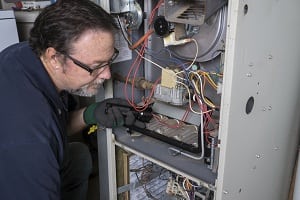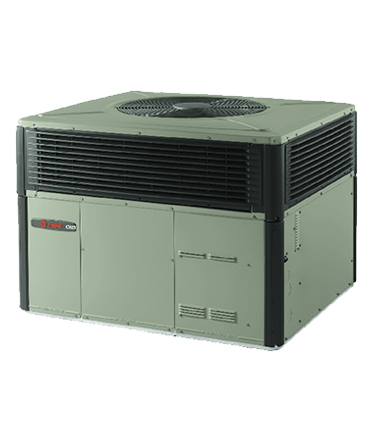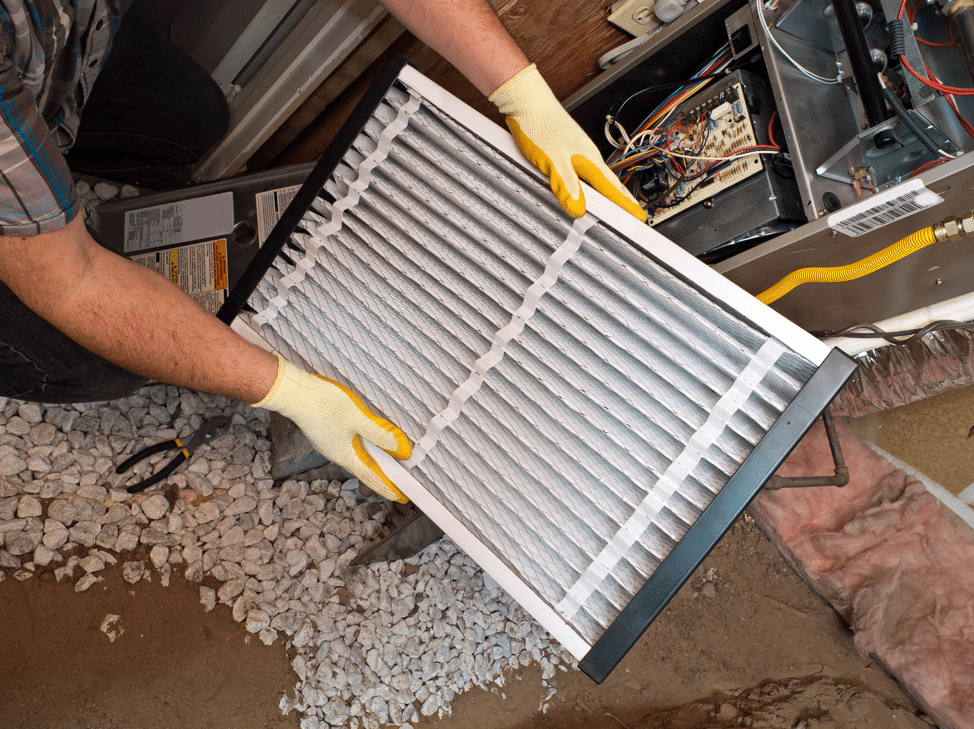What is a Good SEER Rating? SEER Rating Meaning and Importance

A SEER rating is the maximum rating of efficiency for your HVAC unit. This means that though the SEER rating displays a certain number, it’s not always working at that number - the SEER rating number only displays the maximum level of efficiency it can operate at.
SEER ratings are super simple if you just think about them the way you think about MPG in a car. Your car displays a certain MPG, but if you're revving the engine and speeding down the interstate, you're probably not going to get the listed MPG. Apply this concept to your AC unit, and you can see how constantly changing your home's temperature can result in a decrease in efficiency and a suboptimal SEER rating.
Are High SEER Ratings Worth it?
If you've heard the common sales pitch "this SEER rating will pay for itself in 10 years", or something like that, then we hope you haven't fallen for this. Remember, the SEER rating is a measurement of maximum efficiency. It's the limit of your HVAC unit. This means that if you are putting some heavy usage on your AC unit, then you're definitely not getting that high SEER rating number that is labeled on your unit.
In all honesty, we'd prefer to be the HVAC contractor that achieves success by customer trust and long-term repeat customers, not sales pitches on expensive high SEER equipment - that's why we're telling you all of this. In fact, we'd prefer it this way, otherwise, our customer service line would be flooded with irate customers. We don't want that, you don't want that - let's move on.
Upgrading Your Condenser to a higher SEER Rating Does NOT Make Your Entire System that SEER Rating
Many of our customers wonder how they can save money while at the same time upgrading their SEER value. The biggest misconception out there is that you'll improve your SEER rating by purchasing a higher SEER condenser. Well, you can't! You can't just upgrade one HVAC component at a time and expect a higher SEER rating. Not to mention that many components are not compatible with each other causing a whole other batch of headaches to deal with. Stick to this rule of thumb - if you really want that higher SEER rating, have an entirely new HVAC system installed, please.
We hope this sheds some light on SEER ratings and that you have all the information you need to make an informed decision about your new HVAC installation, repair, or maintenance. Thank you again for reading and please call or contact one of our NexGen technicians for any questions you may have about SEER value or any HVAC-related concerns.
Call NexGen Today
Our expertise and commitment to customer satisfaction make us the leading HVAC company in Southern California. To learn more about our equipment, services, and protection plan,
book an appointment online or call
888-277-0415.
3 HVAC Tips For Choosing the Best HVAC Contractor

1. Watch Out for HVAC Contractors that Give You an Estimate Over The Phone
Remember, every home is unique and has many nuances that make each HVAC installation or maintenance on a case-by-case basis. Watch out for HVAC contractors that give you a bid over the phone because there is no way they can know what exactly what your system consists of. There are many factors that go into a proper estimate such as ducting, insulation, and even windows. Make sure your contractor performs a Manual-J calculation for your air conditioning system. None of this can be done over the phone. If you get a phone estimate, take it with a grain of salt and make sure you get a proper estimate when the HVAC contractor comes over to check out your system.
2. Make Sure Your HVAC Contractor Installs the Proper Unit
Many contractors opt to install the same unit (albeit a newer model year) as before. Assuming the average HVAC unit lasts 10-15 years, you should make sure the newer model of your old unit has similar specs, otherwise, you should find something that is actually compatible with the dimensions of your home. A seasoned HVAC contractor will recommend several options to best improve the quality of your home's HVAC system.
3. Don't Take an HVAC Contractor's Years of Experience for Face Value
Many HVAC companies claim they have over 50 years of combined HVAC experience or something like that! Sure, that may be true, but when it comes down to the job, you may only have one or two new contractors with little experience actually working on your HVAC system. HVAC contractors that have nothing else to show other than their "years of experience" should raise a red flag. Make sure your contractor also has great customer reviews and a lot of photos from recent projects.
Also, watch out for HVAC contractors that say they've been following the same process for years. HVAC is still a technology that evolves, and with all evolving technologies come evolving methods and processes. Make sure your contractor is on the leading edge of HVAC technology.
Call NexGen Today
Our expertise and commitment to customer satisfaction make us the leading HVAC company in Southern California. To learn more about our equipment, services, and protection plan,
book an appointment online or call
888-277-0415.
Maximize the Energy Efficiency of Your Home

Are your energy bills leaving you with little money in your pocket? According to Energy Star, around half of all of the energy used in today's homes goes to heating and cooling them. While changing out your light bulbs for LED or CFL options and turning off light switches are great ways to save energy, if you are serious about having an energy-efficient home, you need to focus on comfort system efficiency. At NexGen Air, we want to help our customers in Los Angeles, Anaheim and Palm Desert save money by reducing their energy use and costs. Here are some tips from our experts to help you start saving.
1. Add Proper Insulation
How much heat energy is lost through the attic? If your insulation is insufficient, the answer is more than you might think. Adding a layer of insulation will make your home much more efficient because it will help keep your cooled and heated air inside where it belongs. NexGen Air can help you evaluate your insulation to see if it's sufficient for your home's needs.
2. Install a "Smarter" Thermostat
A smart thermostat or WiFi thermostat gives you greater control over your HVAC system, and greater control means better efficiency. With a smart thermostat that you can control from your phone, you can adjust the temperature in your home from anywhere. While a programmable thermostat allows this as well, with a WiFi thermostat you can make adjustments even when your schedule changes while you’re out. As long as you have access to the Internet, you can adjust your home comfort settings to be as efficient as possible.
3. Get New Window Treatments
Curtains can do more than just decorate your space. Energy-efficient window treatments can help keep heated or cooled air inside your home. They add another insulating barrier between your home and the outside, so you can enjoy less lost energy.
4. Keep Your HVAC System Maintained
Proper HVAC maintenance will help your furnace and air conditioner run at an optimal level. This means greater efficiency no matter the season. At NexGen Air, we recommend having a maintenance check at the start of both the cooling and the heating seasons.
5. Plant a Shade Tree
On the west side of your home, plant shrubs or a tree that can block the sun from pouring in. This is important, because this is the side of the house where the most intense heat will come during the hottest part of the day in the summer. If you choose a tree or bush that loses its leaves, you can enjoy the added warmth in the winter when the plants are bare, and the added shade in the summer when the sun is harsh.
Call NexGen Today
Are you looking for more tips on making your HVAC system efficient? NexGen Air has a team of experts who are ready to help you. We will help you ensure that your HVAC system is not driving up your energy bills. Our expertise and commitment to customer satisfaction make us the leading HVAC company in Southern California. To learn more about our equipment, services, and protection plan,
book an appointment online or call
888-277-0415.
Can Your Heater Handle This Winter?

The last thing any homeowner wants is a freezing home. If you are cautious, you’d always want to have your heating unit regularly maintained, but it’s sometimes impossible to predict when you’ll need repairs. Scheduling regular HVAC maintenance will help solve any potential or current issues before you go through another cold night without heat.
General Repair And Maintenance Practices
If you choose not to have your furnace regularly maintained, you are likely to void the manufacturer’s warranty. In fact, when your heater breaks down and you do not bother to have a professional look at it, you might have to repair or replace your entire heater, which will end up costing you more.
If the filters are not regularly inspected, they can restrict air flow, and this puts a lot of strain on the motor fan, which can eventually lead to overheating or equipment failure. There are also high chances that your indoor air quality might be drastically reduced and this can aggravate asthma, allergies and other illness.
Why You Should Regularly Change Your Furnace Filters
Although most manufacturers recommend that you should have your heating unit filter changed every three months, it’s not a bad idea to check them on a monthly basis to see whether they are filled with debris and dirt. This prevents dust and other subtle substances from circulating in your home and maximizes your furnace’s airflow.
Also, regular replacements protect the critical parts of your heater that might end up causing unexpected damage and hefty repair costs. Apart from the three-month maintenance cycle, you should have a yearly routine inspection to keep your HVAC running like new.
If you abide by the manufacturer's requirement regarding servicing and maintenance, you will hardly run into issues. That being the case, if you have any concerns regarding your heating unit or want it checked for any potential problems, you should get in touch with an HVAC expert and schedule an appointment.
Annual Heating System Tune-Up
Most of the residential heating systems have a lifespan of between twelve to fifteen years. However, your heating unit will have an even shorter duration without proper preventive maintenance. Therefore, scheduling an annual heater tune-up is the best way to ensure that your furnace is working optimally.
If you experience any issues at the heart of the season, it's best if you immediately contact an HVAC technician to attend to the problem as soon as possible. That aside, if there is a prediction of harsh winter then it’s best if you contact a professional to inspect your heating unit beforehand.
Winter is one of the seasons you don’t want to be caught off guard especially when it comes to keeping your home warm. Therefore, if you take note of these precautionary measures, you shouldn’t have to worry when the cold season approaches.
Call NexGen Today
Our expertise and commitment to customer satisfaction make us the leading HVAC company in Southern California. To learn more about our equipment, services, and protection plan,
book an appointment online or call
888-277-0415.
Common Furnace Problems

During cold and rainy weather, the last thing you want to be worried about is your furnace not functioning properly. For this reason, furnace maintenance and repairs are one of the most important actions you can take for your home. Scheduling regular maintenance, inspections, and repairs with a reputable HVAC company in your area such as NexGen, will help prevent furnace problems.
Below are the nine most common furnace problems and why they happen:
1. Lack of maintenance:
If you don’t schedule regular furnace inspections and maintenance, you may be in for an unexpected breakdown just when you need your furnace most. Maintenance is extremely important to help your furnace run as well as it should, and heat your home when you need it.
2. Dirty filters:
Dirty or clogged filters are one of the most common problems for furnace owners. They can reduce airflow and put more strain on the furnace. In extreme cases, filters clogged with dirt and debris can damage the limit switch, which controls the fan, and result in even more problems.
3. Daily wear and tear:
Just like any appliance, constant use will age the appliance quickly and it may malfunction. This is another reason to make sure your furnace is well taken care of by a company like NexGen who makes sure your home is protected and comfortable at all times. Most furnaces last about fifteen years before they need to be replaced.
4. Electric ignition or pilot control problems:
If your furnace isn’t lighting, it can’t heat your home. When you notice the pilot light is out, you will want to call your HVAC technician to have the problem professionally fixed.
5. Malfunctioning thermostats:
If your thermostat is not working correctly, this could lead to your heater or ac not turning on at the times you have programmed it to.
6. Furnace not heating enough:
If your furnace doesn’t keep your house warm enough on a consistent basis, you may have a furnace that is simply too small for your space. An appointment to have a technician inspect your homes HVAC system will help determine what type of furnace your home needs.
7. Frequent on-and-off cycling:
Clogged filters may cause the thermostat and fan to cycle on and off repeatedly, even when the house is not finished heating or is warm enough. Improper airflow may also be the culprit.
8. Noisy furnace:
Rumbling, squeaking, and rattling sounds coming from your furnace may indicate a problem, blockage, or airflow reduction that needs to be investigated by a professional HVAC company.
9. Blower never turns off:
If your blower never seems to turn off, the limit switch may need professional replacement.
Call NexGen Today
Our expertise and commitment to customer satisfaction make us the leading HVAC company in Southern California. To learn more about our equipment, services, and protection plan,
book an appointment online or call
888-277-0415.












